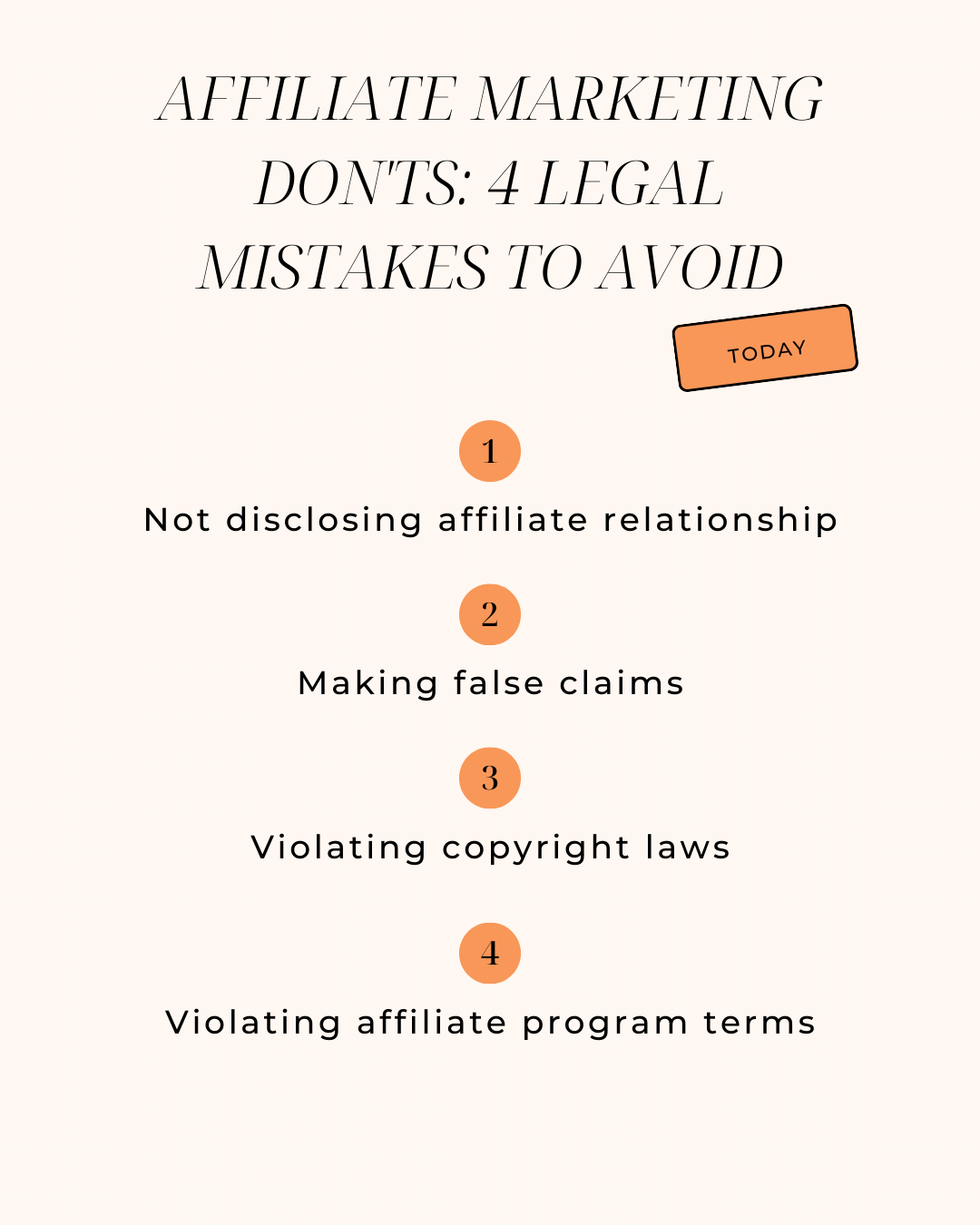Is affiliate marketing legal? Yes! Affiliate marketing is completely legal when done correctly. However, there are important legal requirements and regulations you must follow to stay compliant. From FTC disclosure rules to advertising regulations, understanding these legal requirements protects both your business and your earning potential. Here’s everything you need to know to do affiliate marketing legally.
By understanding these legal risks and taking the necessary steps to protect your business as an affiliate and your affiliates, you can maximize your earnings to ensure that you’re staying compliant with affiliate marketing.

What is Affiliate Marketing?
As an online business owner, it’s likely you have been a part of an affiliate program or have your own. If you don’t know, it’s a pretty cool way to earn some extra cash by promoting another business’s products or services. Basically, you become an affiliate marketer and promote a company’s product or service through a special link called an affiliate link. Whenever someone clicks on your link and buys the product or service, you earn a commission. It’s super easy to get started too – you just need to join an affiliate network or program, which gives you access to lots of different products and services to promote.
Affiliate marketing has become really popular because it’s a win-win for both the businesses and the affiliates. Businesses get more sales and exposure for their products, while affiliates can earn passive income with minimal effort. It’s definitely worth considering if you’re looking for a flexible way to make money online.
Legal Requirements to Stay Compliant in Affiliate Marketing
Disclosing affiliate relationships
One of the most important legal requirements in affiliate marketing is disclosing your affiliate relationship. This means informing your audience that you are promoting a product or service as an affiliate, and earning a commission on sales made through your referral link. Failure to disclose this information can lead to legal action against you and the company you are promoting. To avoid this, always disclose your affiliate relationship in a clear and prominent location on your website or social media platform. This can be done by using a disclaimer or a statement that clearly explains your relationship with the company.
Don’t make false claims
Affiliate marketing programs and their affiliates must adhere to the rules and guidelines set by the Federal Trade Commission (FTC) regarding advertising and marketing practices. Making false or misleading claims about a product or service you are promoting can lead to legal trouble. Always be truthful and transparent in your promotions, and avoid making exaggerated claims that cannot be backed up. It’s important to do your research and only promote products or services that you believe in and have tested yourself. If you’re unsure about a particular claim or aspect of the product, it’s better to err on the side of caution and not promote it.
Don’t violate copyright laws
Using copyrighted material without permission, such as images or videos, can lead to legal trouble. Always make sure to use royalty-free or licensed materials when promoting a product or service. This means obtaining permission to use any copyrighted materials or using materials that are licensed for use in affiliate marketing. Failing to do so can result in legal action against you and the company you are promoting.
Follow affiliate program terms
Each affiliate program has its own terms and conditions that must be followed. Violating these terms, such as by promoting the product on unauthorized platforms or engaging in unethical marketing practices, can result in legal action and the termination of your affiliate account. To avoid this, make sure to carefully review and follow the terms of each affiliate program you participate in. This includes knowing where you can and can’t promote the product, what marketing methods are allowed, and what types of content you can use.
Terms that are usually inside of an affiliate marketing contract are commission rates, tracking and reporting, promotional restrictions, compliance with laws and regulations, termination policies, intellectual property rights, and confidentiality.

What Are The Advantages & Disadvantages Of Affiliate Marketing?
While there are advantages to being an affiliate marketer, there are also some disadvantages to consider. Here are some of the advantages and disadvantages of affiliate marketing as an affiliate:
Advantages:
- Passive income: Affiliate marketing can be a source of passive income, meaning that you can earn money while you sleep. Once you have created your content and included your affiliate links, you can continue to earn commissions as long as people continue to purchase the products or services you are promoting.
- Low startup costs: Affiliate marketing is a low-cost business opportunity because you do not need to create your own product or invest in inventory. You can start by promoting products that already exist and earn a commission on each sale you make.
- Flexible work schedule: As an affiliate marketer, you have the flexibility to work from anywhere and at any time. You can work on your own schedule and set your own goals, making it an ideal opportunity for those who want to work from home or have a flexible schedule.
- Wide range of products to promote: There are many affiliate programs and products available to promote, giving you a wide range of options to choose from. This allows you to find products that match your interests and fits your audience’s needs.
Disadvantages:
- Dependence on the company: As an affiliate, you are dependent on the company to pay you the commission you have earned. If the company goes out of business or does not pay you on time, you may not receive the money you have earned.
- Competition: There is a lot of competition in the affiliate marketing industry, making it challenging to stand out and make a significant amount of money. You need to find ways to differentiate yourself from other affiliates and provide unique value to your audience.
- Uncertainty in earnings: Affiliate marketing earnings can be uncertain because they depend on the number of sales or leads generated through your referral link. This means that your earnings can vary greatly from month to month.
- Limited control over products: As an affiliate, you have limited control over the products or services you are promoting. If the company changes the product or pricing, it could affect your sales and earnings.

What Are The Advantages & Disadvantages Of Running an Affiliate Program?
While there are advantages to having an affiliate program, there are also some disadvantages to consider. Here are some of the advantages and disadvantages of having an affiliate program:
Advantages:
- Increased sales and exposure: Affiliate marketing can help companies increase their sales and brand exposure by reaching new audiences that they may not have been able to reach otherwise. Affiliates can promote the company’s products or services through their own websites, social media platforms, or email lists.
- Cost-effective marketing: Affiliate marketing is a cost-effective way for companies to market their products or services because they only pay a commission to affiliates when they make a sale or generate a lead. This means the company only pays for the marketing that is successful in generating revenue.
- Performance-based compensation: Affiliates are compensated based on their performance, which means that they have an incentive to promote the company’s products or services as much as possible. This can help to ensure that affiliates are motivated to generate high-quality leads and sales.
- Increased customer trust: If a customer learns about a product or service from someone they trust, such as a blogger or influencer, they may be more likely to make a purchase. By partnering with affiliates, companies can build trust with their audience through word-of-mouth marketing.
Disadvantages:
- Potential for fraudulent activities: Some affiliates may engage in fraudulent activities, such as using spam to promote the company’s products or using fake leads or sales to earn a commission. This can result in the company losing money or damaging its reputation.
- Lack of control over promotional methods: Companies may have limited control over the promotional methods used by their affiliates, which could lead to inappropriate or unethical marketing practices.
- Cost of managing the program: Setting up and managing an affiliate program can be time-consuming and costly. Companies may need to invest in technology, staff, and training to ensure that the program runs smoothly.
- Risk of legal issues: Companies need to ensure that their affiliate program complies with all relevant laws and regulations. This includes following advertising and marketing rules, privacy laws, and disclosure requirements.
Wrapping things up: Affiliate marketing strategy and the legal pitfalls
While affiliate marketing can be a lucrative opportunity for both companies and affiliates, it’s important to be aware of the legal pitfalls that come with this industry. In affiliate marketing, it’s important to approach this business opportunity with a critical eye, conduct thorough research, and make informed decisions to mitigate risks and maximize your earnings.
To be successful in affiliate marketing, you should strive to build a strong brand, create high-quality content, and engage with your audience in an authentic and honest way. It’s important to be transparent about your affiliations and only promote products and services that align with your values and are relevant to your audience. By following these best practices and avoiding the common legal pitfalls, you can create a successful affiliate marketing business that provides passive income and helps you achieve your financial goals. Remember, affiliate marketing is a long-term game, and success is determined by consistent effort, hard work, and a willingness to adapt to changes in the industry.
If you’re recommending products or earning through affiliate links—whether it’s just one link or a whole business model, you need to disclose it properly. Inside of The Legal Edit you’ll find an affiliate marketing disclosure you can use across your blog, emails, and social posts, so you can promote while staying FTC compliant.

+ show Comments
- Hide Comments
add a comment